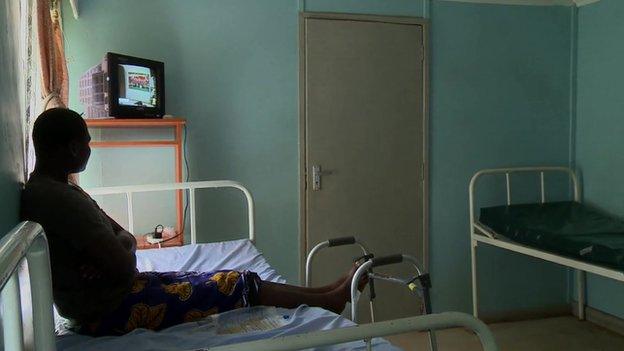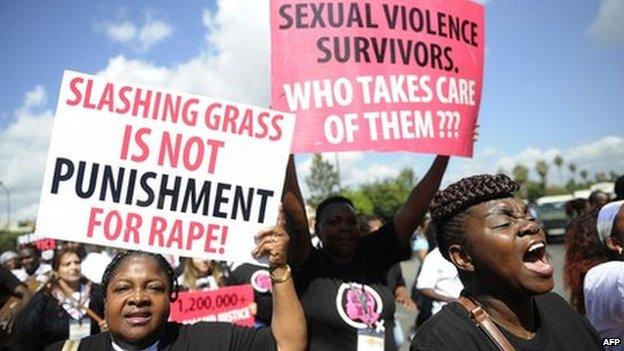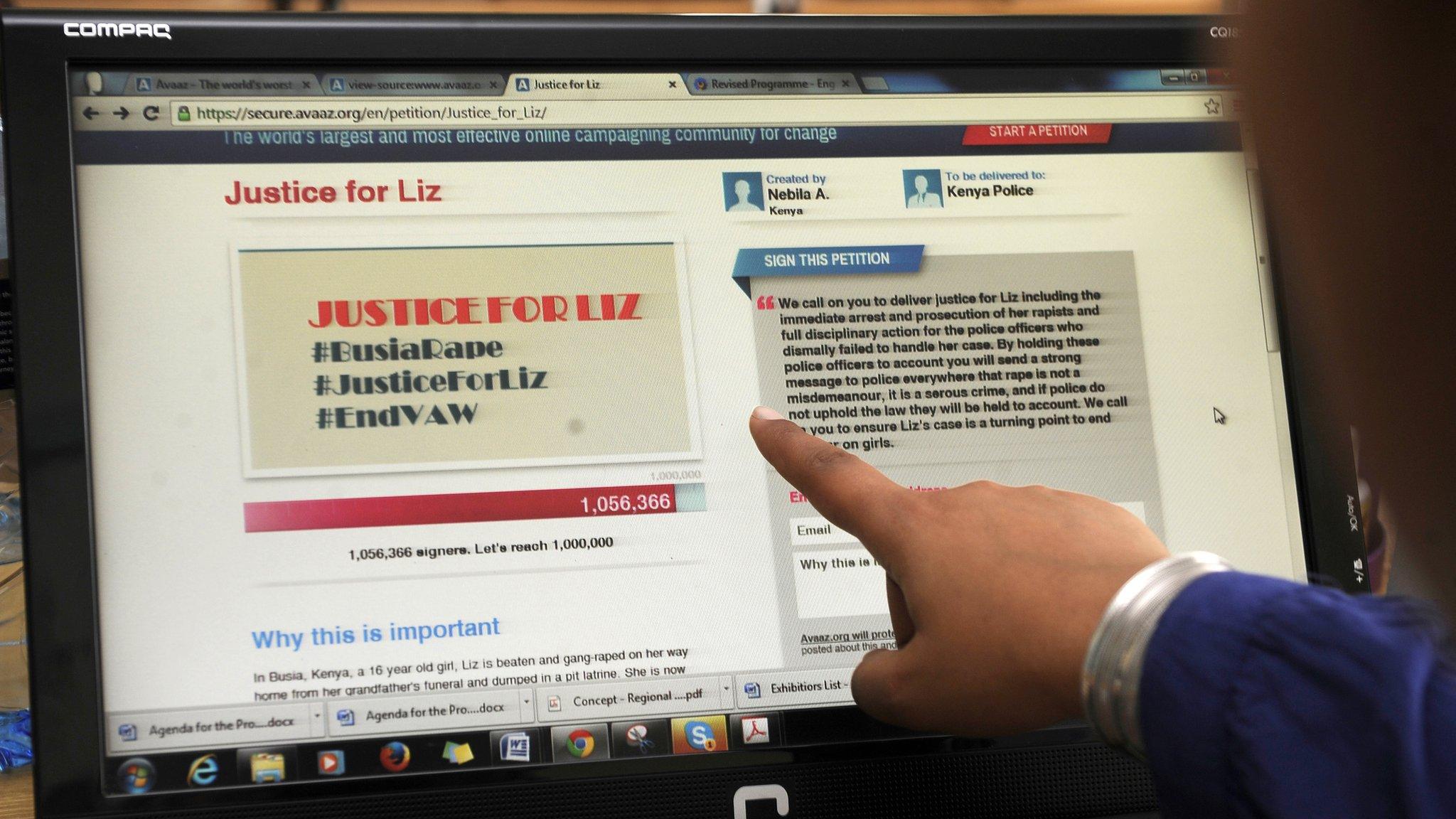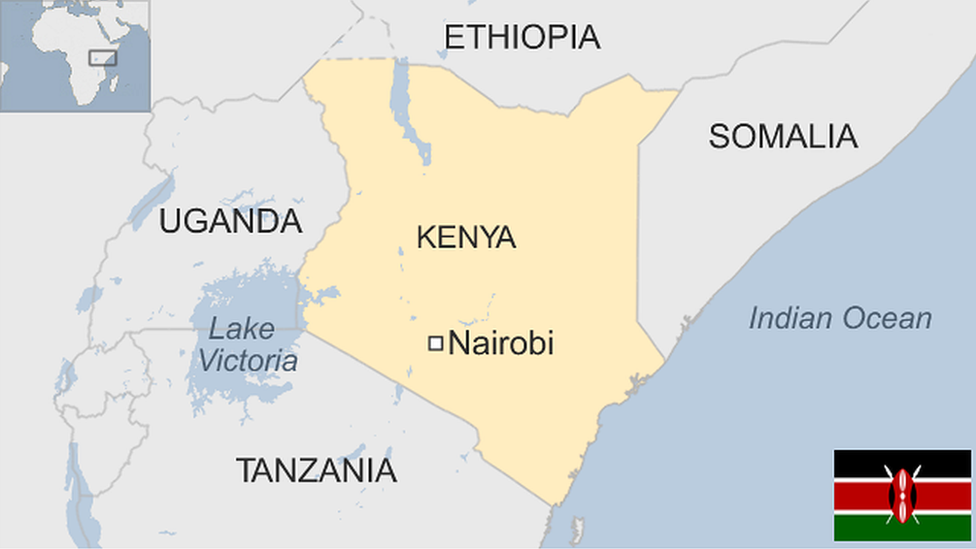Kenya's Liz: Will her alleged rapists be charged?
- Published
Liz's mother tells the BBC's Anne Soy: "I want justice to be done"
The mother of the 16-year-old Kenyan girl who says she was raped by six men and dumped in a 22-ft (6.7m) deep latrine looked numb with worry.
But she told the BBC from the hospital where her daughter is receiving treatment that she is thankful for the support the family has received worldwide.
"I am very grateful to all the people who have supported us through this ordeal," she said.
Her daughter was attacked and repeatedly raped by six men in June as she returned from her grandfather's funeral in Tingolo village in Busia County, western Kenya.
Her unconscious body was thrown into a pit latrine and she is now in a wheelchair.
Her case caused an uproar after Kenya's influential Daily Nation newspaper reported that the police in Busia had asked three of the suspects she identified as her rapists to cut grass as punishment and had chosen not to prosecute them.
In a BBC interview on Thursday, Police Inspector General David Kimaiyo said an investigation into the girl's allegation had been concluded, but still no decision had been taken on whether it was a rape case.
He said he was unaware that her alleged attackers were ordered to cut grass and that the case was reported to police only two months after "the incident".
No emotion
But several hundred activists in Kenya's capital, Nairobi, carrying placards, waving underwear and beating drums marched to the police headquarters, where the inspector general's office is located, and handed over a petition calling for the arrest of the suspects and the officers who allegedly failed to prosecute them.
The petition, which was started online,, external was signed by more than 1,200,000 people from around the world.

There are concerns about whether Liz will make a full recovery
Saida Ali, executive director of the Coalition on Violence Against Women (COVAW) rights group, was among the protesters who handed the petition to police on Thursday.
"The response was polite, they promised to take action, so we will wait to see that action," she said.
The girl, who is called Liz to protect her identity, is being cared for at the Gynocare Centre in Eldoret, 156km (97 miles) from Busia.
Her mother is staying with her at the hospital.
I briefly saw Liz, who answered my greeting in Swahili, the main language in Kenya, but the rest of the time she just stared, showing no emotion.
We were told that this is an improvement and that last week she had refused to look any of her visitors in the eye.
The Nation Media Group, a Kenya-based media house which first reported the story, has paid the medical bills for Liz amounting to more than $7,000 (£4,300).
Their reporter named her Liz and that is how the world now knows her.
Her mother said that since the online campaign began some people had even set up an education fund for Liz.
But her medical condition is still of concern.
She suffered fistula because of the rape - a condition where she lost control of the flow of urine and stool.

According to Kenyan law, gang rapists can face at least 15 years in prison
The programme manager at the hospital, Jared Momanyi, said she had undergone surgery to correct the fistula.
"She was also traumatised but has been receiving counselling and she is improving," he added.
She also injured her spine when she was thrown down the pit latrine and has been unable to walk for some time.
'Suspects in hiding'
Since the matter went public, and viral, the mother says some family members of the suspects have been threatening her.
"They said that if their sons are arrested I'll see fire," she said.
Earlier her husband had to endure insults from a father of one suspect, who had initially offered to help the family, and then rescinded his decision.
"I want the suspects to be arrested and justice to be done. Up to now no-one has been arrested. I hear some have gone into hiding," Liz's mother said.
The inspector general of police confirmed that the suspects could not be traced, adding that they had fled into Uganda.
Busia - where the incident took place - is near the Kenya-Uganda border.
The Director of Public Prosecution, Keriako Tobiko, has ordered their arrests but none has been made so far.
However, Mr Tobiko confirmed to the BBC that he had received the investigations file from the police and was going through it.
"I will press charges once I find sufficient evidence," he said.
The Sexual Offences Act of 2006 spells out tough punitive measures against people convicted of various sexual crimes.
The Act empowers the court to issue a sentence of not less than 15 years for a conviction of gang rape, but the court may extend the sentence to imprisonment for life.
The police in June released a report showing that reported cases of rape had increased to 383 between January and May this year, from 332 for the same period last year.
Police stations in Kenya are expected to have a gender desk where such cases are reported.
But Liz's mother rarely smiled during her interview - she sounded like she had lost faith in the authorities.
- Published28 October 2013

- Published7 July 2010
- Published7 October 2010
- Published4 July 2023
